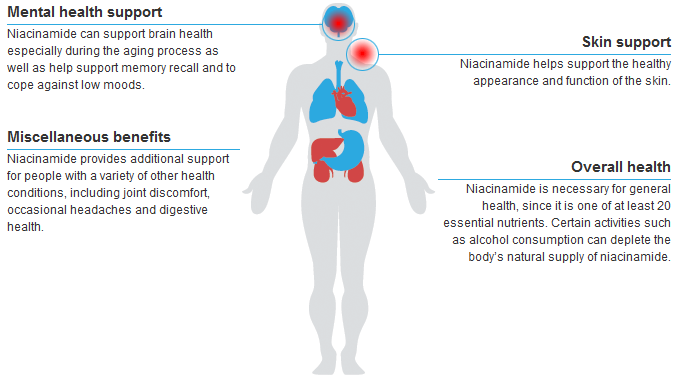 Niacinamide, also known as nicotinamide and nicotinic amide, is the biosynthesized form of niacin, commonly known as vitamin B3. Both forms provide the same vitamin functions, although niacinamide doesn’t cause the flushing that niacin does. Niacin normally enters the body through dietary sources, which is then converted into niacinamide. The primary biochemical uses of niacinamide are the synthesis of nicotinamide adenine dinucleotide phosphate (NADP) and nicotinamide adenine dinucleotide (NAD), which are enzymes in a variety of oxidation-reduction reactions.
Niacinamide, also known as nicotinamide and nicotinic amide, is the biosynthesized form of niacin, commonly known as vitamin B3. Both forms provide the same vitamin functions, although niacinamide doesn’t cause the flushing that niacin does. Niacin normally enters the body through dietary sources, which is then converted into niacinamide. The primary biochemical uses of niacinamide are the synthesis of nicotinamide adenine dinucleotide phosphate (NADP) and nicotinamide adenine dinucleotide (NAD), which are enzymes in a variety of oxidation-reduction reactions.
The most important dietary sources of niacin are animal proteins. Many nuts and mushrooms also contain significant levels of niacin. The best plant sources of niacin include dates, avocados, and tomatoes. Many foods are also supplemented with niacin, especially cereal products. Pure niacinamide is commercially produced from 3-cyanopyridine, commonly known as nicotinonitrile.
Niacin was discovered in 1873, although its role as an essential nutrient for humans wasn’t established until 1937. Both niacin and niacinamide are commonly taken as dietary supplements, primarily for their nutritional value. A commonly used daily requirement for niacin is 14 mg/day for women and 16 mg/day for men. A daily intake above 35 mg/day may cause flushing. Niacinamide also provides specific benefits that are generally related to helping support healthy inflammation management, especially for skin conditions.
The primary use of niacinamide supplements is to support healthy levels of vitamin B3. It is also taken to support many other cellular functions which is why it is a key ingredient in our Male Rejuvenator, and our Multi-Xtra.
Niacinamide can support brain health, especially during the aging process as well as help support memory recall and to cope against low moods.
Niacinamide provides additional support for people with a variety of other health conditions, including joint discomfort, occasional headaches, and digestive health.
Niacinamide helps support the healthy appearance and function of the skin.
Niacinamide is necessary for general health, since it is one of at least 20 essential nutrients. Certain activities such as alcohol consumption can deplete the body’s natural supply of niacinamide.

The most obvious symptoms of pellagra (vitamin B3 deficiency) generally affect the skin, digestive system, and mental functioning. Skin conditions commonly caused by pellagra include itchy skin, red lesions, and sensitivity to sunlight. The digestive signs of pellagra are primarily diarrhea.
Vitamin B3 deficiency also causes mental conditions such as aggression, confusion, insomnia, and dementia in severe cases. Additional conditions associated with pellagra include physical weakness, loss of coordination, numbness, and paralysis in the extremities.
nicotinamide, nicotinic acid, niacin, vitamin B3

In our pursuit of vibrant health, many of us strive for a balanced diet packed with nutrient-rich foods. However, even the most wholesome diet may still leave us lacking in essential nutrients, particularly Omega-3 fatty acids. Healthy Eating is O...

Immune System Support Zinc Background and Benefits Zinc is a chemical element with the atomic number 30. It is chemically similar to magnesium in some ways since the ions are about the same size and have the same common oxidation state. Zinc is an essential nutrient for virtually all life forms, ...
Shipping calculated at checkout